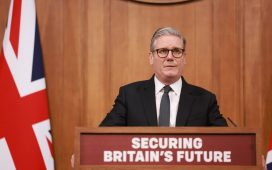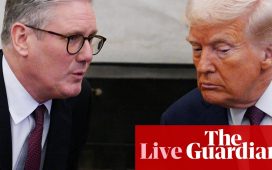UK to hold further talks with EU on NI protocol ‘in coming days’, says James Cleverly
James Cleverly, the foreign secretary, says there will be more talks with the EU “in the coming days” on the Northern Ireland protocol – which suggests Sammy Wilson may have been right this morning when he said he did not expect an agreement to be reached this week. (See 9.33am.)
Cleverly made the comment in a tweet posted after a conversation about the protocol this afternoon with Maroš Šefčovič, the European Commission vice-president and EU Brexit negotiator, and Chris Heaton-Harris, the Northern Ireland secretary.
Good to speak again with @MarosSefcovic and @chhcalling about ongoing work on NI Protocol. We are focused on finding a durable solution for NI.
Intensive work continues and we agreed to talk again in the coming days.
— James Cleverly🇬🇧 (@JamesCleverly) February 20, 2023
Key events
Filters BETA
Humza Yousaf emerges as frontrunner to replace Nicola Sturgeon
Humza Yousaf has emerged as the frontrunner to replace Nicola Sturgeon as Scotland’s first minister after pledging to uphold her socially progressive policy agenda, my colleague Severin Carrell reports. He writes:
The Scottish health secretary said on Monday that he backed Sturgeon’s stances on same-sex marriage, abortion clinic buffer zones, banning conversion practices and on gender recognition changes, stating he would “absolutely” challenge the UK government’s block on Holyrood’s gender recognition bill.
He said the UK government’s decision to block the bill, which recent polls suggest is supported by a majority of Scottish voters, was in reality “an assault, an attack” on Holyrood’s autonomy.
He said: “Is somebody really going to suggest to me we should lay down and allow them to trample over the will of the Scottish parliament [on] a bill that had support from every single political party?”
The full story is here.
Junior doctors in England to strike for 72 hours in March after 98% vote in favour in BMA ballot
Here is my colleague Andrew Gregory’s story about the vote by BMA junior doctors for strike action in March. He says this will be only the second such action in the 74-year history of the NHS.
Junior doctors in England are set to go on strike for 72 hours next month in their dispute over pay, the British Medical Association has announced.
The BMA said that 98% of junior doctors voted for the strike action. More than 47,600 junior doctors in England were eligible to vote in the ballot and almost 37,000 votes were cast, meaning there was a 77.5% turnout.
Dr Robert Laurenson and Dr Vivek Trivedi, the co-chairs of the BMA junior doctors committee, said:
The government has only itself to blame, standing by in silent indifference as our members are forced to take this difficult decision.
UK to hold further talks with EU on NI protocol ‘in coming days’, says James Cleverly
James Cleverly, the foreign secretary, says there will be more talks with the EU “in the coming days” on the Northern Ireland protocol – which suggests Sammy Wilson may have been right this morning when he said he did not expect an agreement to be reached this week. (See 9.33am.)
Cleverly made the comment in a tweet posted after a conversation about the protocol this afternoon with Maroš Šefčovič, the European Commission vice-president and EU Brexit negotiator, and Chris Heaton-Harris, the Northern Ireland secretary.
Good to speak again with @MarosSefcovic and @chhcalling about ongoing work on NI Protocol. We are focused on finding a durable solution for NI.
Intensive work continues and we agreed to talk again in the coming days.
— James Cleverly🇬🇧 (@JamesCleverly) February 20, 2023
Conor Burns, a former Northern Ireland minister and keen Brexiter, has posted an interesting thread on Twitter about the protocol negotiations. Despite being one of Boris Johnson’s most loyal allies, he has not followed Johnson in taking a swipe at Rishi Sunak’s negotiating stance. Instead he is urging colleagues to give Sunak a chance.
The thread starts here.
1/12 Watching the debate around the negotiations on the Northern Ireland Protocol a few random thoughts. Firstly, I wish @RishiSunak well. He is to be commended for soberly trying to fix something that has been a problem since it was entered into.
— Conor Burns (@ConorBurnsUK) February 20, 2023
And here is Burns’ conclusion.
9/12 changed and it is futile to rehearse it. The stakes on all of this are very important. The people who matter most here are the people of Northern Ireland – a people I care for very much as I am of them. It is too important for point scoring
— Conor Burns (@ConorBurnsUK) February 20, 2023
10/12 between the front benches, those looking for relevance in the face of irrelevance or people simply wanting to cause trouble. The PM deserves one thing from all sides and quarters: wait and see what his deal (if there is one) contains.
— Conor Burns (@ConorBurnsUK) February 20, 2023
11/12 Then by all means analyse it, test it, support or condemn it. But at least give him the space to bring it forward if that is where we get to. As I said at the start he is to be commended for at least trying.
— Conor Burns (@ConorBurnsUK) February 20, 2023
12/12 Having spent many months living the Protocol I came to one simple conclusion – it was much more complicated from the front benches than it seems from the backbenches. Which was why many on the front bench below the rank of PM barely tried. I wish him the luck he will need.
— Conor Burns (@ConorBurnsUK) February 20, 2023
Braverman says NI protocol bill is key to getting deal with EU, implying sympathy with Boris Johnson’s argument
Suella Braverman, the home secretary, has suggested that it would be wrong for the government to shelve the Northern Ireland protocol bill. Speaking to reporters on a visit this morning, she said:
We’ve been aware for some time now of challenges relating to trade, customs and sovereignty when it comes to Northern Ireland and the Northern Irish protocol.
The legislation that the government introduced is one of the biggest tools that we have in solving the problem on the Irish Sea.
It’s clear and it’s right that the prime minister is committed to finding a pragmatic solution to resolve these issues, which are affecting the people of Northern Ireland, and that we find a solution that’s pragmatic and workable both for the EU and the United Kingdom.
Her comment on the bill is much closer to what Boris Johnson was saying, through a spokesperson, at the weekend than to what Downing Street was saying this morning. (See 1.02pm.)
The argument that the bill is an important “tool” for fixing the protocol problem is based on the theory that the threat of the UK unilaterally abandoning the protocol has persuaded the EU to compromise. Perhaps that is true to an extent, although the fact that the bill has not been debated in the Lords since October implies the threat is now on hold. If the government were to push the bill through its final stages in the Lords, peers would almost certainly vote down some of its key clauses.
Tory enthusiasts for the bill seem to fall into two categories. On the Today programme this morning Simon Clarke was implying the government should keep debating the bill, to keep the pressure on Brussels in the final stages of the negotiation. (See 9.33am.) Boris Johnson seems to be arguing that, even if a deal is agreed, the bill should still be passed, so the UK retains leverage over the EU. (See 1.02pm.)
Downing Street does not seem to agree with either proposition.
Brexiters urged to be pragmatic as some of them argue protocol deal should take NI out of single market
As a deal on the Northern Ireland protocol gets closer, Brexiters opposed to the protocol seem to be escalating their opposition to it. In 2021 the DUP set out “seven tests” for reform of the protocol. None of them explicitly say Northern Ireland must explicitly be taken out of the EU’s single market (although tests 4 and 6 imply this). But this morning Sammy Wilson, the DUP chief whip, said explicitly that a deal that kept Northern Ireland in the single market would be unacceptable. (See 9.33am.) Simon Clarke, the former levelling up secretary and leading Liz Truss ally, also said this morning he wanted Northern Ireland to stop being part of the single market. Given that the whole point of the protocol is to allow Northern Ireland to remain in the single market, this is quite an ask.
As the Brexiters (or at least some of them) firm up their position, other Tories are urging them to compromise. As the Evening Standard reports, Sir Bob Neill, the chair of the Commons justice committee, has urged his colleagues to be pragmatic. He said:
What we need is pragmatism not dogmatism.
It’s ridiculous to take purist points when you have got serious issues about people’s businesses, livelihoods and security. People have to grow up and compromise.
Sir David Lidington made the same argument on the World at One. (See 2.33pm.)
Sir David Lidington, who was in effect Theresa May’s deputy when as PM she was trying to get MPs to agree her Brexit deal, told Radio 4’s the World at One that his party should abandon its “self-indulgent quarrelling” and back Rishi Sunak if he can negotiate a compromise with the EU on the Northern Ireland protocol. He said:
If [Sunak] comes back with a deal that is an improvement on the one Boris Johnson negotiated, then I hope my party and the country as a whole will get solidly behind him. There’s so many other things that need to be tackled.
I hope we don’t get a repeat of the self-indulgent quarrelling that I think has done so much damage to my party’s standing with the public over recent years.
Lidington also said Sunak should have a Commons vote on the deal, if and when it is agreed, even if technically there is no need for one. MPs were likely to force a vote anyway, he said. And he went on:
I think the good rule is, if you believe that something is in the national interest to do well, then you do it and you make your case and you try to persuade people accordingly.
There are two urgent questions in the Commons this afternoon after 3.30pm, about the violence outside a hotel housing asylum seekers in Knowsley and about football governance.
FROM 1530:
1. UQ – G Howarth – Asking about implications of the violent incident in Knowsley 10 Feb
2. UQ – @LucyMPowell – Asking for statement on fan-led review of football gov and publication of football white paper
3. @TomTugendhat – Security Threat to UK-based journalists— Labour Whips (@labourwhips) February 20, 2023
After the UQs, at around 5pm, Tom Tugendhat, the security minister, will make a statement prompted by yesterday’s Sunday Times story about a TV station run by dissident Iranians in the UK closing after the police said they could not protect it from attack by terrorists working on behalf of the Iranian state.
At the weekend Antony Blinken, the US secretary of state, said Washington believed China was considering supplying arms to Russia for use in the war in Ukraine.
At the Downing Street lobby briefing the PM’s spokesperson said this would be deplorable. Asked about the US assessment, the spokesperson said:
I obviously can’t get into intelligence. But certainly the UK and US share assessments regularly, as you would expect.
On this specific issue, any support for Putin’s brutal and illegal war against Ukraine is deplorable.
We expect China to stand up for Ukraine’s sovereignty and territorial integrity.
Braverman says police being told to treat violence against women and girls as ‘national threat’
Suella Braverman, the home secretary, has also been on a visit this morning to promote a policy initiative on crime. She was publicising eight initiatives that she described collectively as one “one of the toughest suites of measures” that the government has taken to deal with domestic abuse. Speaking in Warrington, she said:
Domestic abuse is horrendous crime, and enough is enough, and today I’m announcing one of the toughest suites of measures that the government has put forward to better protect victims of domestic abuse.
I’m changing the law to ensure that there’s more robust monitoring of perpetrators of domestic abuse.
We’re introducing measures to ensure that we will be able to tag offenders of domestic abuse, and we will also be adding offenders of domestic abuse onto the violence and sex offenders register.
Also, all police chiefs and forces around the country will now be put on a footing to deal with violence against women and girls as a national threat.

Keir Starmer and Yvette Cooper, the shadow home secretary, visited Thurrock in Essex this morning to promote Labour’s plans to use “hotspot policing” to tackle drug dealing. Explaining the concept, Labour said:
As part of the previously pledged 13,000 neighbourhood police and PCSOs and alongside new town centre patrols, Labour will introduce data-driven hotspot policing targeted at common drug dealing sites to tackle the local gang networks and dealers who are blighting communities.
Hotspot policing would mean that, where there are surges in reporting of local drug dealing in particular areas or at particular times, neighbourhood police would be deployed to flood the area to arrest and deter dealers.
Using new technology, neighbourhood police will target areas including outside schools and town centres which are often vulnerable to drug dealing. Hotspot policing is acknowledged by experts to be one of the most effective ways of preventing local crime.

‘We shouldn’t gobblefunk around with words’ – No 10 criticises decision to rewrite Roald Dahl’s books
Rishi Sunak has criticised the decision to rewrite some of Roald Dahl’s books that are now deemed offensive.
At the Downing Street lobby briefing, asked if Sunak was in favour of the move, the PM’s spokesperson said:
When it comes to our rich and varied literary heritage, the prime minister agrees with the BFG that we shouldn’t gobblefunk around with words.
I think it’s important that works of literature and works of fiction are preserved and not airbrushed.
We have always defended the right to free speech and expression.
No 10 delivers snub to Boris Johnson by refusing to commit to passing Northern Ireland protocol bill
Even though No 10 said there is no deal yet on the Northern Ireland protocol (see 12.13pm), much of the lobby briefing this morning was taken up with questions about what the deal is expected to involve. Here are some of the other points that came up.
-
No 10 refused to commit to passing the Northern Ireland protocol bill. The bill, which would allow the UK government to ignore parts of the protocol (even though this would break international law, lawyers argue), has been on hold in the House of Lords since October. Boris Johnson has said, through a spokesperson, that it should not be abandoned, because passing it allow the UK to retain leverage over the EU. The Observer and the Sunday Telegraph both splashed on this at the weekend.
This morning Johnson’s fellow Brexiter Simon Clarke made a similar argument. (See 9.33am.) But at the lobby briefing the PM’s spokesperson refused to say what would happen to the bill (which Sunak is expected to abandon as part of a deal with the EU), and he would not commit to it finishing its passage through parliament. The spokesperson said the bill would be “an important piece of legislation” in the absence of a deal with the EU, but he also stressed that the government would “prefer to achieve a negotiated solution”.
-
The spokesperson declined to describe Boris Johnson’s intervention as “helpful”. Yesterday Penny Mordaunt, the leader of the Commons, made this argument, saying Johnson was reminding the EU what might happen in the event of no deal being agreed. Asked if Sunak agreed, the spokesperson did not endorse what Mordaunt said, explaining that he had not asked Sunak about this.
-
The spokesperson refused to commit to MPs getting a vote on the deal. Technically it seems the government would not have to hold a vote (assuming the deal does not involve treaty change, which the EU opposes). Asked if Sunak would hold a vote anyway, the spokesperson did not commit to one, but did not rule one out either. “You will hear more from us should an agreement be reached with the EU that meets the challenges [set out],” the spokesperson said.
-
The spokesperson declined to say the protocol deal would have to meet the seven tests set out by the DUP. Yesterday Mordaunt told the BBC’s Laura Kuenssberg that a deal would have to meet those tests. Referring to the DUP tests, Mordaunt said:
Those are the tests this has to pass. If this deal does not pass those tests it won’t work, it’s as simple as that.
Asked if Sunak agreed with the seven tests, the spokesperson said the government had set out its own aims for the protocol renegotiation, and that the tests were a matter for the DUP.
-
The spokesperson refused to say whether the government would insist on the treaty enacting the protocol being rewritten. The EU is opposed to this, but the DUP would like the treaty to be abandoned or rewritten. Asked what the government’s view was, the spokesperson said he would not get into that. But he added:
Certainly the protocol as enacted is not working and that is what needs to be resolved.
No 10 says ‘no deal has been done as yet’ on Northern Ireland protocol
The Downing Street lobby briefing has just finished, and the PM’s spokesperson told journalists that “no deal has been done as yet” on the Northern Ireland protocol.
Some reports have claimed that a technical deal has been agreed, and that it has been sitting on Rishi Sunak’s desk for some days, and that all that needs to be resolved are the political optics around it. But, when asked if there was a deal, the PM’s spokesperson told journalists that Rishi Sunak had held “positive conversations” with Ursula von der Leyen, the European Commission president, and the Northern Ireland parties in recent days. He went on:
It’s clear we need to find solutions that protect Northern Ireland’s place in our internal market, safeguard the Good Friday agreement and resolve the practical issues the protocol is causing for families and businesses.
The prime minister has been clear we have not resolved all of those issues, and no deal has been done as yet.
The prime minister and Von der Leyen agreed there had been good progress and that intensive work in the coming days is still needed at official and ministerial levels. That is our focus for the coming days.
I will post more from the briefing shortly.










